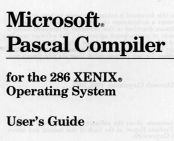| Microsoft Pascal | |
|---|---|
 Microsoft Pascal Compiler for the 286 XENIX Operating System User's Guide, part number 8511I-330-05, document number 020-092-013, from 1985. | |
| Original author | Microsoft Corporation |
| Initial release | 1980 [1] [2] |
| Stable release | |
| Operating system | MS-DOS, Xenix, OS/2 |
| Type | Pascal programming language |
| License | Commercial |
Microsoft Pascal is a discontinued implementation of the Pascal programming language developed by the Microsoft Corporation for compiling programs for running on its MS-DOS and Xenix [5] operating systems and, in later versions, on OS/2 (like many other Microsoft programming tools, albeit they are only capable of generating 16-bit programs for the latter).
